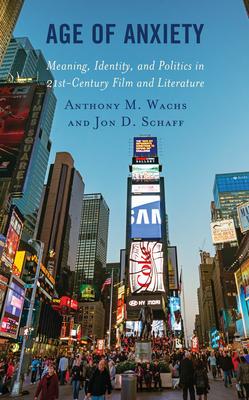Age of Anxiety: Meaning, Identity, and Politics in 21st Century Film and Literature analyzes literature and films that speak to our age of anxiety resulting from the decline of narratives that provided individuals with a meaningful human life. The authors argue that the twentieth-century sought to free individuals from the constraints of authoritative cultural traditions and institutions, liberating the autonomous self. Yet this has given rise to anxiety rather than liberation. Instead of deriving one's sense of purpose from one's role and place within a community, the consumer has been deceived into thinking that their identity can be purchased through the meaning represented by the conspicuous consumption of a brand. The same phenomenon manifests itself in politics within recent populist revolts against globalist politics. In addition, the rapid pace of technological development is driving an unprecedented faith in the malleability of human beings, raises doubts as to what it means to be a person. Utilizing paradigms from the fields of Communication/Rhetoric and Political Philosophy the book shows how the self has been displaced from its natural habitat of the local community. The book traces the origins of modern anxiety as well as possible remedies. Considered in the book are such popular culture artifacts as Downton Abbey, WALL-E, Hacksaw Ridge, Westworld, and Lord of the Rings and zombie films.

Age of Anxiety: Meaning, Identity, and Politics in 21st-Century Film and Literature
Age of Anxiety: Meaning, Identity, and Politics in 21st Century Film and Literature analyzes literature and films that speak to our age of anxiety resulting from the decline of narratives that provided individuals with a meaningful human life. The authors argue that the twentieth-century sought to free individuals from the constraints of authoritative cultural traditions and institutions, liberating the autonomous self. Yet this has given rise to anxiety rather than liberation. Instead of deriving one's sense of purpose from one's role and place within a community, the consumer has been deceived into thinking that their identity can be purchased through the meaning represented by the conspicuous consumption of a brand. The same phenomenon manifests itself in politics within recent populist revolts against globalist politics. In addition, the rapid pace of technological development is driving an unprecedented faith in the malleability of human beings, raises doubts as to what it means to be a person. Utilizing paradigms from the fields of Communication/Rhetoric and Political Philosophy the book shows how the self has been displaced from its natural habitat of the local community. The book traces the origins of modern anxiety as well as possible remedies. Considered in the book are such popular culture artifacts as Downton Abbey, WALL-E, Hacksaw Ridge, Westworld, and Lord of the Rings and zombie films.